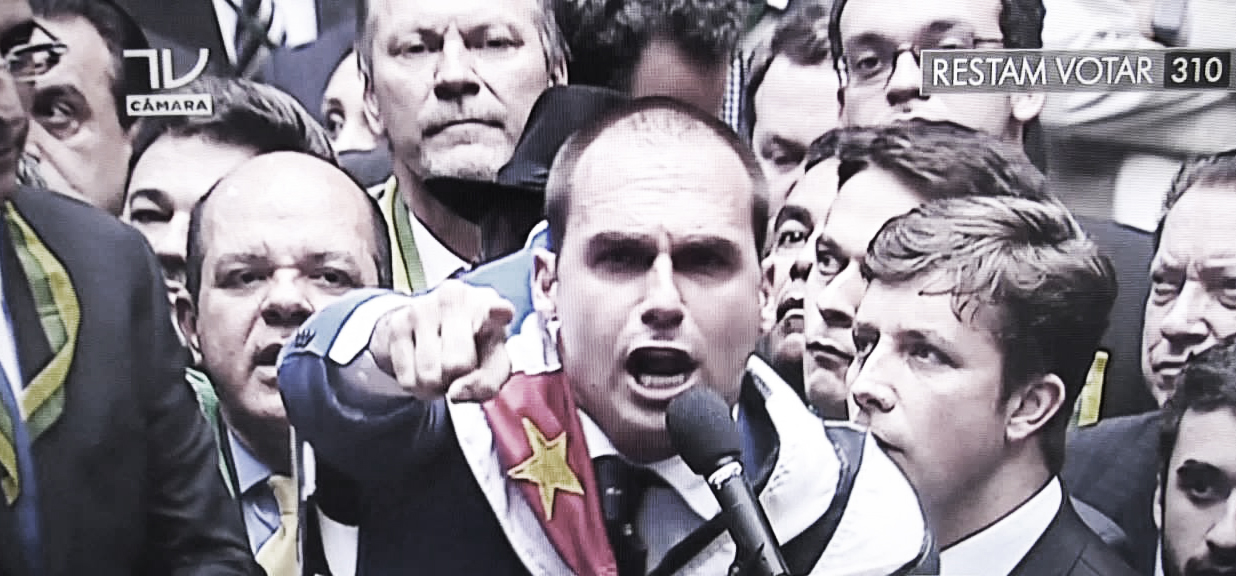With the Bolsonaro family already shaken by the revelations drawing them closer to the murder of Rio City Congresswoman Marielle Franco, Federal Deputy Eduardo Bolsonaro’s comments about an Dictatorial backlash should the Brazilian left emulate what has happening in Chile, has placed him at risk of official punishment, a prison sentence and loss of his mandate.
Considered even more extreme-right than his father, Eduardo Bolsonaro had until recently been lined up to be Brazilian Ambassador to the United States.
An offial request for his removal from Congress will be delivered on November 5 – the same day that nationwide protests have been called against President Bolsonaro.
By Cristiane Sampaio.
The statement by Deputy Eduardo Bolsonaro (PSL) about the possibility of a “new AI-5” in Brazil provoked furious reactions from across the political sphere.
On 31st October, PSOL, with the support of the PT, PDT, PSB, PCdoB and Rede, presented a criminal complaint to the Supreme Court. The parties argue that the conduct of Eduardo Bolsonaro constitutes incitement and apology for crime, which are covered in articles 286 and 287 of the Penal Code.
Signed by dictator Costa e Silva in 1968, Institutional Act No. 5 (AI-5) was a decree establishing the most repressive phase of the military regime in Brazil, leaving a trail of intense disqualification, dismissal, forced retirement and death.
In an interview aired on Thursday on with Leda Nagle, Eduardo said that if the Brazilian left decided to radicalize, the answer could be with “a new AI-5”.
“We will resist on the streets and here in parliament against the dictatorship. We do not accept dictatorship.” stressed the leader of PSOL in Congress, Ivan Valente.
As a penalty for such cases, the law provides for the possibility of detention of three to six months or payment of a fine. The five political parties also prepared a complaint against Eduardo Bolsonaro for the Congressional Ethics Council. The document should be filed next Tuesday (5).
The group claims that Bolsonaro’s statement violates the Federal Constitution, the internal norms of Congress, because it damages Brazil’s democratic and representative institutions, namely the Legislature. In the document, the parties intend to request the removal of the son of the President of the Republic from his seat in Congress.
“He abuses the prerogatives granted to parliamentarians, in particular parliamentary immunity. The deputy is using immunity to defend the end of democracy, threaten parliament and attack the constitution, which he has sworn to defend,” said opposition leader Alessandro Molon (PSB-RJ).
Jandira Feghali (PCdoB-RJ) said that “freedom of opinion can not violate the Constitution, especially from a public official.” and called it “an attack on young democracy.”
Facing a massive backlash, Eduardo Bolsonaro spoke again during an interview for the TV programme “Brasil Urgente”. “I apologize to anyone who has understood that I am studying the return of the AI-5, or thinking that the government would somehow be studying any measure in that direction. This possibility does not exist. Now a lot of that is a misrepresentation of what I said.” he claimed.
This did not soften the criticism. The opposition leader said “public office demands great responsibility and does not tolerate attacks on democracy disguised as errors” and said the request for his removal from Congress should continue.
The rejection of the deputy’s statement came from different political-ideological sectors. “What he said is very serious, very serious. From zero to ten, the level of severity is ten,” said the chairman of the Ethics Council, Juscelino Filho (DEM-AM), who will address the opposition’s request for Eduardo Bolsonaro’s removal.
Rodrigo Maia (DEM-RJ) and Davi Alcolumbre (DEM-AP) also reacted. Maia said that statements such as the deputy “are repugnant, from the democratic point of view, and have to be repelled as much indignation as possible by the Brazilian institutions.”
Alcolumbre said that “there is no room for talk of authoritarian regression.” “It is unfortunate that a politician, elected by popular vote, a fundamental instrument of the democratic rule of law, can insinuate against the tool that gave him his own mandate,” he added in a public statement.
A joint statement by seven Senate party leaders said: “The parliamentarian advocates the return of a dictatorial instrument antagonistic to the first article of our Constitution: ‘All power emanates from the people, who exercise it through elected representatives or directly’. It is an outrage against the foundations of the Democratic Rule of Law, in particular the guarantee of political pluralism and the independence and harmony between the Legislative, Executive and Judiciary Powers.”
The rejection was even supported by PSL, Eduardo Bolsonaro’s party, which belongs to the far right and has different members who defend practices such as those of the military dictatorship.
This was not the only time Bolsonaro has used such rhetoric. On Tuesday 29th, he said in Congress that the country could use police repression if there are popular protests like those underway in Chile, where the population has been taking to the streets to complain against the rising cost of living as a result of neoliberal policies.
In October last year, before the presidential elections, Eduardo Bolsonaro threatened the Supreme Court if it challenged his father’s candidacy. “If you want to close the STF, […] send a soldier and a corporal,” he said at the time.
Behind the scenes, an interpretation is that the Bolsonaro family’s public statements about possible authoritarianism must be contained because they aggravate the country’s institutional crisis and, as a result, help to cloud the political environment.
“This type of statement is highly corrosive, dangerous, even stimulating increasingly hostile actions. If society naturalizes such a statement as normal, the more difficulty parliament has to deal with the issue, or the severity that we understand it to have.”says Paulo Pimenta (RS), leader of the PT in Congress.
This article originally appeared at Brasil de Fato. Translated by Brasil Wire.
[qpp]

